
The military operation that the U.S., the U.K. and France have launched against Libyan leader Moammar Gadhafi thus far lacks a clear set of strategic goals. The coalition partners cannot agree regarding whether the operation is intended to remove Gadhafi, to support rebel operations against Gadhafi loyalists or simply to protect civilians from attack by Gadhafi’s military forces. The lack of a strong, well-defined set of strategic objectives means that military operations in and over Libya are likely to be incoherent. All this is bad enough, but perhaps worse is that there is little indication that France, the U.K. or […]




